A Guide to Volunteer Work on Farms
When Traveling
Where and How to Combine Cultural Immersion and Enjoying the Local Land on a Budget
Article and photos by Jonathon
Engels
Updated by Transitions Abroad 9/30/2023
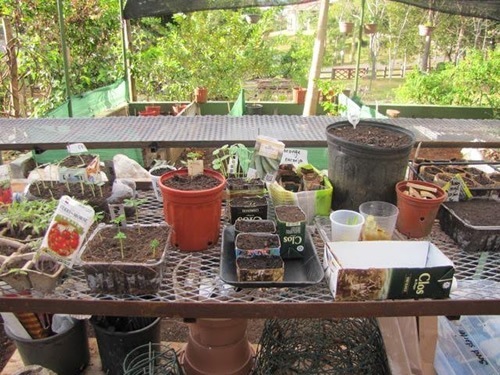
|
|
Volunteer work on a farm and
can involve creating mixed seedlings.
|
In recent times, it's likely that you've come across the term WWOOF, which stands for World Wide Opportunities on Organic Farms. Undoubtedly, the concept of volunteering on organic farms has been gaining significant traction in the realm of travel. With the emergence of various organizations and websites providing similar opportunities, such as HelpX and WorkAway, the landscape of this form volunteering has expanded dramatically. Travelers and hosts alike have seized upon these possibilities, making it an attractive option for those with budget constraints.
However, the appeal of a farm-stay experience extends far beyond just its economic advantages. It holds the potential to offer enriching experiences and benefits to everyone involved.
If you’ve never traveled in this way,
undoubtedly whether you are the penny-pinching tourist,
the keen adventurer, the outdoors lover, or are interested
for some other reason, you are likely curious how the whole
thing works—from lining up a volunteer farm work position to what
the expectations of both the host and traveler should be.
Here's a guide offering the essential information
to get you started.
How to Find an Organic Farm
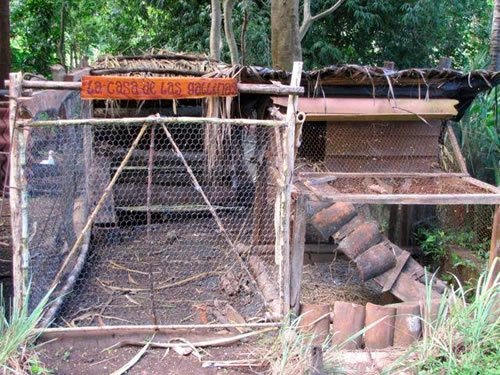
|
|
One of my first jobs as a volunteer
was building a chicken coop and roost. It was done
from found materials around the farm.
|
In essence, sites like WWOOF, WorkAway,
and HelpX are
the global version of the classifieds for volunteers. Posts
can be in the steamy jungles of Amazon, or they can be amongst
the chilly expanses of Canada. In reality, if you are interested
in going somewhere, then it is safe to assume that volunteering
is a possibility at that destination.
When choosing a farm-stay, it's essential to consider more than just the location. Your preferences and interests should play a significant role in your decision. For instance, if you're a vegan, the idea of milking a goat may not excite you, or if you're passionate about gardening, building an eco-friendly cob house might not be your top choice. Thankfully, most websites provide detailed information about each farm, allowing you to align your interests with the tasks involved. This ensures that the work itself becomes a fulfilling part of your experience.
Additionally, there are other factors to take into account. Hosts who make the effort to explain their projects thoroughly are likely to approach the work with equal enthusiasm, making it a more inspiring opportunity for volunteers. Think about the farm's location in relation to your travel goals. A remote location may not be ideal for architectural sightseeing or nightlife, but it could be perfect if you want to immerse yourself in the local culture and language. In essence, weigh the pros and cons of each farm to ensure you get the most out of your volunteering experience.
How to Acquire a Volunteer Post at a Farm
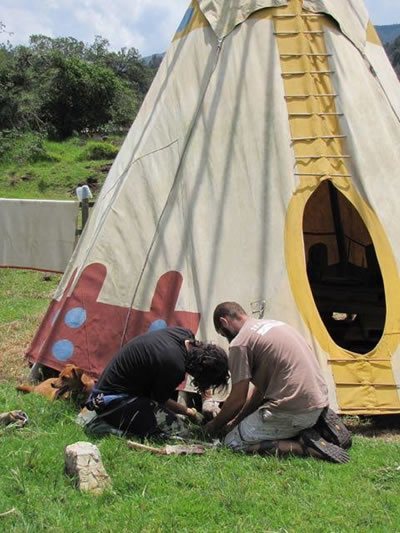
|
|
I had the unique opportunity to stay in a tipi on a farm in Colombia, marking my first experience sleeping in one. What made it even more special was that I was actively involved in both setting it up and taking it down. |
With the growing popularity of WWOOFing, hosts now have more choices when selecting volunteers, just as you had the opportunity to choose your preferred farm. This means that finding volunteer positions can sometimes be competitive, especially during busy seasons. To increase your chances of securing your desired position, it's important to put effort into your inquiries.
If you've carefully chosen a farm that aligns with your interests, explaining why it appeals to you should come naturally. Share any relevant experience you have, and don't worry if you have none because enthusiasm can be just as valuable. Additionally, briefly mention why the region is of particular interest to your travel plans. Keep your messages concise but friendly and inquisitive. Hosts appreciate volunteers who see the exchange as more than just a way to get free accommodation.
There are some specific strategies that can enhance your chances. Apply to multiple farms, treating it like a job search. Start sending your inquiries at least a couple of weeks in advance, and ideally a few months ahead. While it's possible to find positions quickly, allowing more lead time gives you the freedom to be selective. Initially, request a two-week stay to avoid feeling trapped if the experience doesn't meet your expectations. Many hosts also prefer this trial period to get to know volunteers before extending longer stays.
What to Expect as a Volunteer
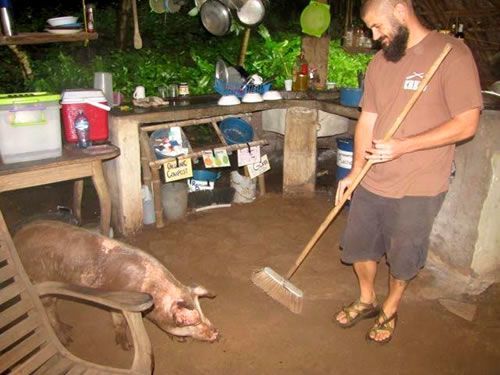
|
|
During my first morning at Totoco Organic Farm in Nicaragua, I was awakened by the sounds of a pig rummaging around in the open-air kitchen located beneath my loft. |
For travelers, volunteering on farms
often equates to much more than room and board. It provides
access to more remote regions and a
deeper experience of a culture, subculture, and a country.
Farm work as a volunteer helps put us in tune with the weather,
the landscape, the flora, and the fauna. We are likely to
connect immediately with people who know the area well,
who can provide us inside tips on where we should go, the type
of local fare we ought to try, and why customs are as they
are. The experience also teaches
us something new about farm volunteering, perhaps how
to build a mud house or make rich compost.
In a typical exchange, you'll receive a place to sleep and food in exchange for your work. The accommodations can vary widely, from a dorm bed to a private caravan, a guestroom, a tipi (yes, really), or a loft in a barn. Basic amenities like bathrooms and a functional kitchen are usually provided, but don't expect luxuries like heating or air conditioning. Most hosts offer blankets, pillows, and sometimes even towels, but it's a good idea to check if you need to bring a sleeping bag. Often, your first task as a volunteer will be to tidy up your living space to make it comfortable.
Food will be part of the deal. While most hosts cover all three meals, some may cut back (just inquire if you're concerned). Usually, meal preparation is a do-it-yourself affair with occasional group cooking sessions to foster camaraderie between hosts and volunteers. The food tends to be simple, often vegetarian, including items like beans, rice, vegetables, fruits, bread, cheese, and pasta. Most hosts are accommodating when it comes to dietary restrictions, but they typically make it clear in their listings if they have specific food preferences or limitations like "No vegans allowed!" or "No meat allowed!"
What the Host Will Expect
at the Farm
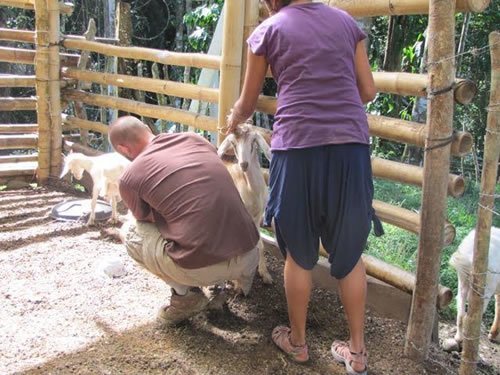
|
|
After holding out for cheese
made “the right way,” it was this experience, milking
a goat in Costa Rica, that fully converted me to veganism.
Nevertheless, I very much respect this farmer for
how she loves her animals.
|
For hosts, volunteers bring a lot to
the equation as well. Sometimes, without volunteers, a host's
project wouldn't be possible. Often the work will be physically
challenging, hot, wet, or repetitive. Nevertheless, good
hosts won’t ask that volunteers do anything they themselves
wouldn’t. Jobs can vary greatly, ranging from childcare
to digging ditches, harvesting apples to planting seedlings.
Some hosts are very loose about it all, offering options
and opportunities for personal creativity. Other hosts have
a more precise goal in mind in terms of the work to be completed.
Whatever the individual situation, what
all hosts seem to seek are self-motivated volunteers
who dive into tasks rather than waiting for constant instruction.
Hosts like people with their own ideas and a genuine interest
in what they are doing. Volunteers who can share, not just
in the work, but also the communal task of living, such as cooking
or cleaning up, are all the more welcome. In general, the
less a volunteer appears to be someone simply there for a cheap
place to stay, the more such motivated individuals make
a host feel comfortable and confident.
In most cases, hosts expect volunteers to work around five hours a day, five days a week. While the specific details might vary slightly depending on the farm or site (WorkAway, for instance, strictly adheres to the five-hour limit), this is the standard arrangement. Occasionally, hosts may ask for fees, although this practice goes against WorkAway's guidelines. These fees typically cover the cost of your meals. Keep in mind that charging fees for food can be more common in certain regions, like Costa Rica, while it's less common in others, such as Spain. The more information a host provides in their volunteer position description, the better you'll understand what's expected of you. If there's limited information about your tasks, be prepared for a bit of uncertainty in your daily activities as a WWOOFer.
Other Important Considerations for Volunteer Farm Work
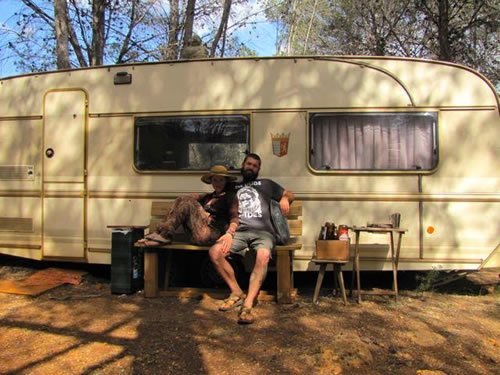
|
|
My wife and I propped against
our caravan in Alozaina in Andalusia, Spain. It’s
amazing how quickly places start to feel like home.
|
In the world of volunteer opportunities, there are some amazing deals for those with flexible schedules and a strong sense of initiative. Many hosts, when they realize they have reliable and committed volunteers, start offering additional benefits like modest salaries, personal projects, or better accommodation to encourage them to stay longer. It's not uncommon for a planned two-week stint to extend into two months or even two years in some cases. For travelers, this means embarking on real adventures, often at minimal or no extra cost, and the potential to sustain this style of travel for a long time.
Another option is to
look for paid work, typically involving seasonal jobs like fruit and vegetable picking. Paid seasonal work opportunities are more prevalent in prosperous countries such as Australia, New Zealand, Europe, and the United States. In these roles, you'll have a set schedule (often long hours) and receive a paycheck (usually modest). These positions often require visas and paperwork, and while they offer enriching experiences, they might leave you with less free time for leisure.
No matter which path you choose, or if you combine them, farm-stays can add a truly unique dimension to your country exploration and travel experiences. These farms foster an instant sense of camaraderie among fellow volunteers from around the world, and they serve as excellent sources of information about other volunteering opportunities or places to visit. You can acquire fascinating new skills, discover alternative lifestyles, and forge friendships that transcend borders and generations. The main challenge is summoning the initial courage to embark on this journey. Once you take that first step, the whole process falls into place, and you'll wonder why you didn't start this unique and fulfilling style of travel sooner.

|
Jonathon
Engels earned an MFA in creative writing.
He has lived, worked and/or volunteered in seven
different countries, traveling his way through
nearly 40 countries between them. His many interests include permaculture, veganism, and ways to live sustainably.
|
|
